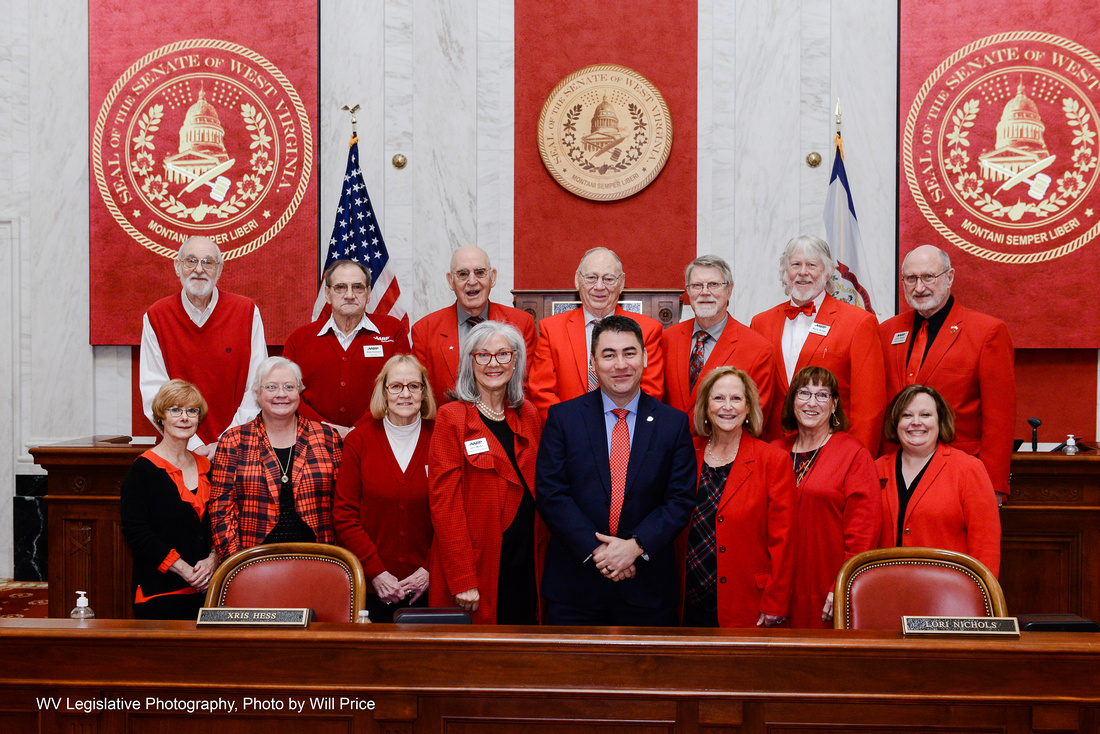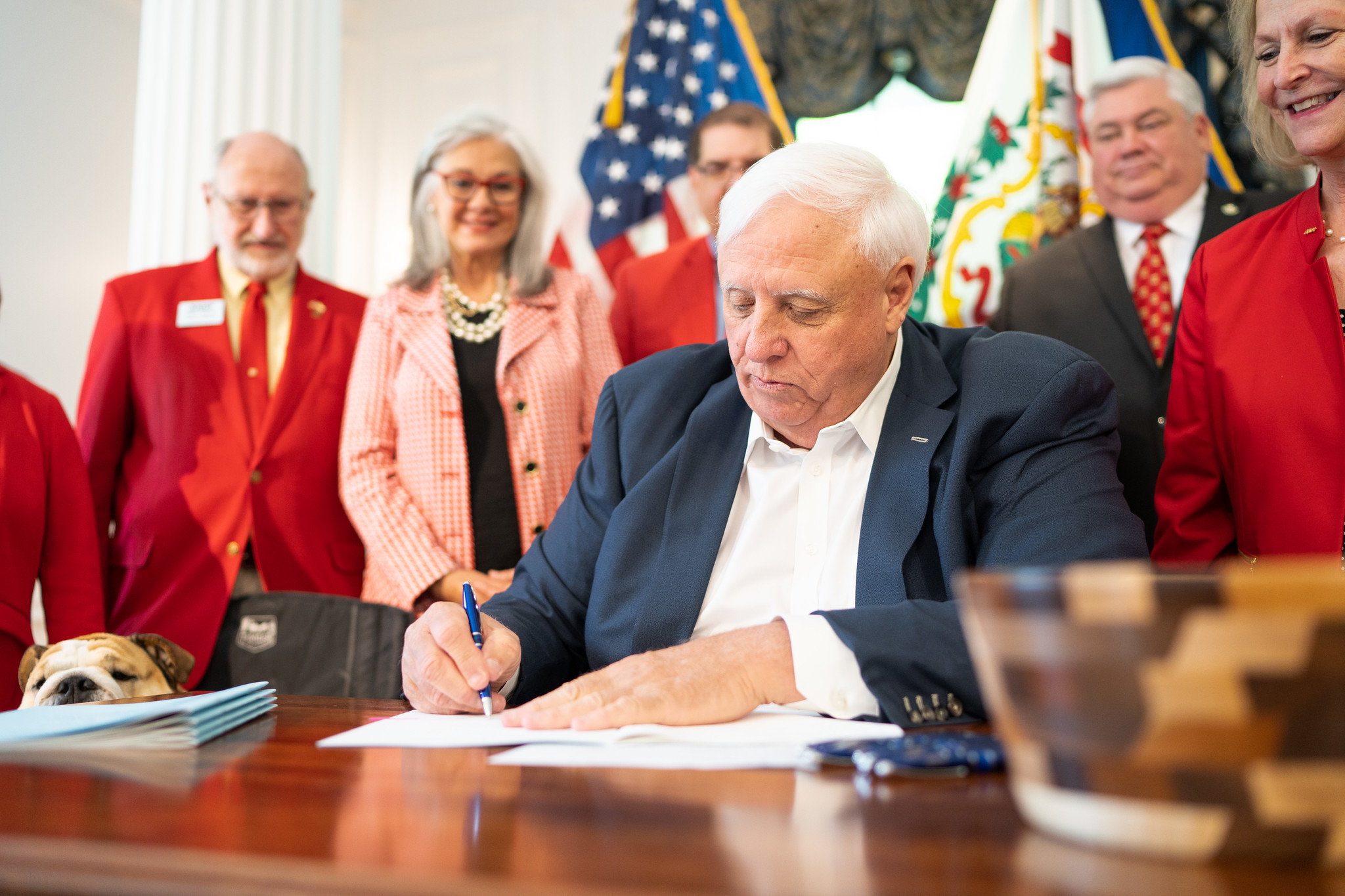AARP Hearing Center
AARP West Virginia’s Capitol Advocacy Team, a dedicated group of volunteers from communities across the state, did an outstanding job in maintaining a strong presence with lawmakers and leaders during the 60-day regular session of the West Virginia Legislature that concluded on Saturday, March 11.

For the first time in nearly three years, AARP West Virginia state advocacy volunteers from communities across the Mountain State returned in-person to Charleston to advocate on the issues important to 50-plus West Virginians and their families.
Capitol Advocacy Team members engaged in-person with lawmakers and legislative staff at the State Capitol during the 2023 West Virginia Legislature regular session, January 11 - March 11 . Team members not present in Charleston represented AARP as "virtual red coat" advocacy volunteers, engaging with lawmakers and participating in daily legislative activity from their homes, remaining visible and influential in making positive change for 50-plus West Virginians and their families.
Here are some of the highlights of the work accomplished by AARP West Virginia volunteers on behalf of 50-plus West Virginians and their families during the 2023 West Virginia Legislature.
Increasing Prescription Drug Access and Affordability
Diabetes has escalated to epidemic proportions in the Mountain State. According to 2022 data from the Centers on Disease Control and Prevention, more than 223,000 West Virginians have been diagnosed with diabetes by a health care professional. The direct medical costs attributed to diabetes in the state each year exceed $1.7 billion, while nearly $640 million in indirect costs annually are attributable to the disease.
The rising cost of prescription drugs, specifically insulin, remains a significant financial hardship for West Virginians 50-plus. From 2009 to 2019, the price of insulin tripled even though there has been no change in the product. As a result, many dependent upon this life saving and life sustaining medication ration their doses or go without, often with deadly consequences.

Senate Bill 577, reducing the co-pay cap on insulin and devices and permitting purchase of testing equipment without a prescription, passed by wide bipartisan margins in both chambers.
The legislation was completed in the final hours of the 2023 session. Gov. Justice hosted a April 19 bill signing ceremony (left) at the State Capitol, where AARP Capitol Advocacy Team volunteers and staff joined him to commemorate the passage of the legislation.
Under the new law, cost sharing for a 30-day supply of a covered prescription insulin drug is limited to $35, including situations where the covered person is prescribed more than one insulin drug, regardless of the amount or type of insulin needed to fill such covered person’s prescription. Cost sharing for a 30-day supply of covered devices is limited to $100, including situations where the covered person is prescribed more than one device. Each cost-share maximum is covered regardless of the person's deductible, copayment, coinsurance or any other cost sharing requirement.
States, including West Virginia, have taken action to address the issue. The West Virginia Legislature took a significant first step in 2020 when it enacted House Bill 4543 to cap insulin co-pay costs at $100. Approximately 25 other states – including neighboring Kentucky, Virginia, and the District of Columbia have enacted similar laws that limit out-of-pocket expenses for insulin.
With this year’s passage of SB 577, West Virginia is now the only state in the country to cap copays at $35 in the aggregate, regardless of quantity or type. Five other states (Colorado, Delaware, Illinois, Maine and Vermont) cap co-pays in the aggregate, but the cost sharing minimums in those states are set at $100.
In addition to SB 577, the House of Delegates also passed House Resolution 18. urging the Congress of the United States to enact federal law that allows for the expiration on pharmaceutical product patents in certain instances.
Easing Financial Stress, Ensuring Financial Resilience To Take Control Of Retirement
Over the past two years, AARP West Virginia has worked closely with NRTA and its state affiliate, the West Virginia Association of Retired School Employees, to ensure the rights and benefits of current pension recipients are enhanced and not undermined.
Senate Bill 237 provided a one-time bonus and increasing the minimum monthly benefit for certain state retirees.
This legislation provides a one-time $1,500 bonus to state retirees over age 70, who have at least 20 years of total service as of July 1, 2023, and whose monthly annuity is less than $1,000.
The legislation also increases the minimum monthly benefit to $1,000 for those age 70 with at least 25 years of service.
More than 5,000 retired state employees and teachers will receive this bonus. While the onetime bonus is a good first step, there are many who won’t qualify and need financial relief.
AARP will continue to fight to ensure the rights and benefits of current pension recipients are not undermined or reduced. We will continue to encourage state and local governments to make their annual contributions to retirement systems. We will also continue to support efforts that protect the long-term viability of existing defined benefit plans and the financial security of retirees.
Ensuring Access to Essential Services
This year’s Budget Bill, House Bill 2024, maintains support for critical services that promote greater responsiveness, opportunity, and commitment to the needs of older West Virginians.
AARP worked to preserve funding for the numbers of individuals served or eligible to receive Medicaid Home and Community-Based Services (HCBS), as demonstrated by the Budget Bill.
AARP also advocated to provide sufficient funding for the state's Aged and Disabled Waiver (ADW) program. AARP will continue to call on state policymakers to expand these home and community-based programs, which provide vital relief and support to individuals and their family caregivers.
In the past five years, the number of individuals served in their homes has increased by 50 percent. AARP believes that it is important to direct resources to areas that achieve the most impact for family caregivers and older West Virginians. Our long-term advocacy on this issue ensures that older adults can live independently in their homes - where they want to be - for as long as possible. This also makes more financial sense than costly institutional care.
Strengthening Health Care Delivery and Expanding Access To Care
During the past year, AARP West Virginia brought together stakeholders representing aging services providers, consumer advocates, and related professionals including higher education institutions, the West Virginia Bureau of Senior Services, the West Virginia Department of Health and Human Resources' Bureau of Medical Services and the West Virginia Legislature, to develop legislative and regulatory recommendations and other actionable items for key stakeholders to significantly increase West Virginia’s direct care workforce (DCW) through evidence-based recruitment and retention initiatives, including integrated compensation, skills training, and job improvements.
In December, 2022, this working group, known formally and collaboratively as the West Virginia Direct Care Taskforce, provided recruitment and retention recommendations to the West Virginia Legislature. These recommendations included a legislative study resolution - Senate Concurrent Resolution 23 - to address the impact of public benefits income eligibility guidelines on direct care workforce participation.
This study and other recommendations from the taskforce are designed to improve the quality and supply of an affordable, well qualified direct care workforce. Implementing these recommendations will support family caregivers and provide necessary support to allow people to choose how they live as they age.
As a result of this work, West Virginia will allocate $4 million in a state funds to implement recommendations from the Direct Care Taskforce. AARP has provided technical assistance to state officials in support of their request to the Center for Medicaid Services (CMS) to reappropriate federal American Rescue Plan Act (ARPA) dollars, and collaborated with the identified host agency to launch an 18-month pilot and two legislative oversight studies, including the aforementioned SCR 23.
Supporting Broadband Enhancement and Promoting Digital Inclusion
Working to implement the bipartisan Infrastructure Investment and Jobs Act of 2021, AARP
West Virginia has secured membership representation on both the West Virginia Broadband Enhancement Council (BEC) and the state's Digital Equity Steering Committee. Senate Bill 246, as introduced, restructured the BEC by reducing its membership and eliminating AARP's presence on the Council. Working collaboratively with the West Virginia State Office of Broadband, AARP successfully advocated for changes to the legislation to ensure continued BEC representation of 50+ West Virginians. This advocacy will allow AARP to influence efforts to address the needs of older consumers, ensure inclusion in state Digital Equity plans, and address key barriers to broadband adoption, including affordability, availability, and quality of service, as well as digital skills development.
Combatting Fraud and Financial Abuse
Scams and fraud continue to be financial threats to many older West Virginians. As technology evolves and automation becomes increasingly a part of our daily lives, scams are becoming more sophisticated and challenging to combat. AARP advocates for legislative and regulatory changes at the federal and state levels to better protect consumers from financial exploitation, scams, and fraud by focusing on prevention, intervention, training, recovery, and increasing enforcement.
AARP West Virginia worked closely with the State Auditor’s Office on legislation to address the financial exploitation of vulnerable adults. Senate Bill 576 would have established a state restitution fund for West Virginia residents who have suffered financial losses as a result of an investment scam. The fund would have provided restitution assistance up to $25,000 to victims of securities fraud, or up to $50,000 if the victim is a vulnerable person over the age of 65. After unanimous passage by the Senate, on February 27, the legislation failed to gain traction in the House of Delegates as the House Finance Committee elected not to take the bill up for consideration.
Supporting Veterans and Military Families
AARP has a long history of supporting veterans, military, and their families. Nationwide, more than five million of our nearly 38 million members are veterans and military. While working with those who have worn our nation’s uniform, AARP has developed a deeper understanding of the unique challenges they face. During the 2023 Legislative Session, AARP pledged its support to Senate Bill 616. This legislation would have established a fund, administered by the West Virginia Housing Development Fund, to provide eligible veterans who are first-time home buyers with access to mortgage loans to purchase a primary residence in West Virginia. While this legislation did not complete the legislative process this session, AARP believes that programs such as this are an important step towards providing our veterans with the support they need to establish a stable, secure home in West Virginia.































































